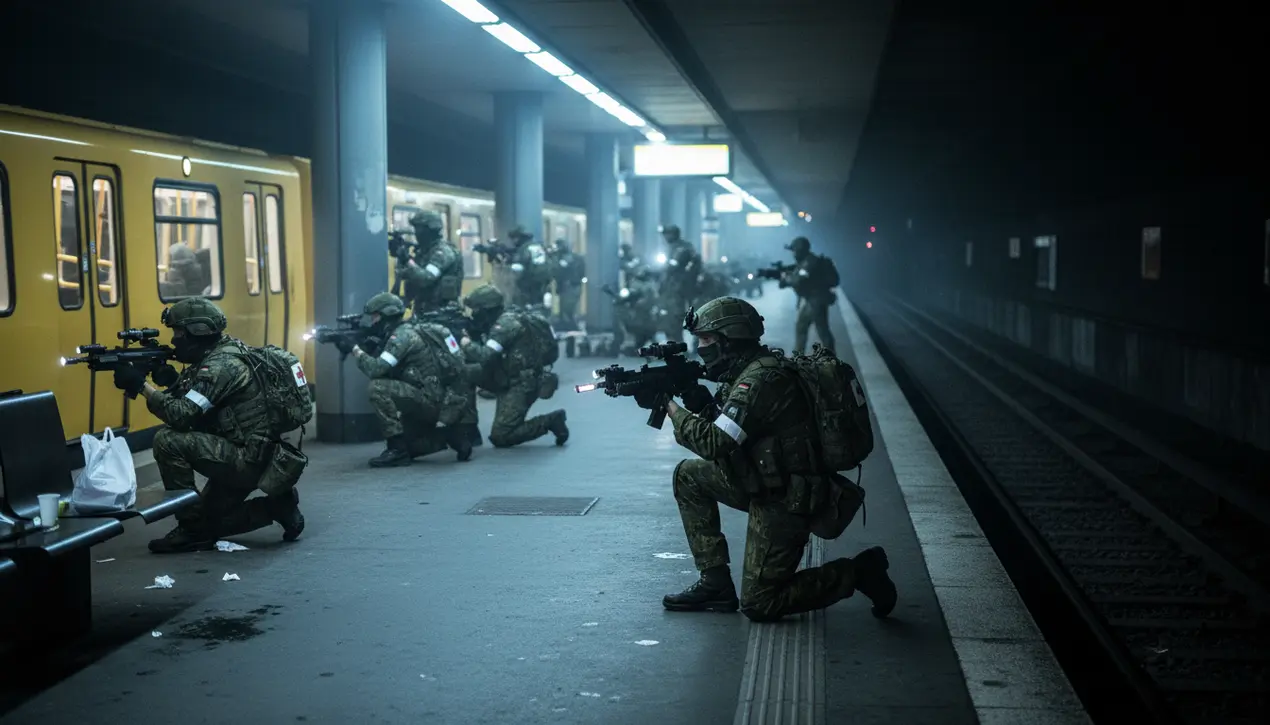
Politicsconflict & defenseMilitary Operations
German Special Forces Conduct Night Training in Berlin Subway.
JO
John Parker
1 hour ago7 min read1 comments
In the dead of a Berlin night, the familiar urban soundtrack of the city stilled, replaced by the sharp, professional cadence of a highly specialized military operation unfolding deep underground. At the Jungfernheide station in Charlottenburg, a nexus for both U-Bahn and S-Bahn lines, the scene was anything but routine.Thirty-five soldiers from Germany's elite special forces, the Kommando Spezialkräfte (KSK), were a study in controlled intensity. Clad in full combat gear and armed with assault rifles, their faces set with a focus that belied the hour, they moved through the cavernous, artificially lit spaces in a meticulously choreographed defense drill.This was not a response to a specific, imminent threat, but a stark rehearsal for a scenario no city ever wants to face: a hostile takeover or terrorist incident within its critical public transport infrastructure. The choice of location was deliberate and symbolic.Jungfernheide is a major transport hub; a successful attack there would not only cause catastrophic loss of life but would paralyze a significant portion of Berlin's mobility, creating a ripple effect of chaos and economic disruption. The exercise speaks to a broader, grim reality of modern European security.In the years following high-profile attacks in cities like Paris, Brussels, and London, the tactical playbook has evolved. Security forces now train for the unthinkable in the most mundane of places—subway stations, concert halls, and public squares—recognizing that these soft targets are the front lines of contemporary asymmetric warfare.The presence of the KSK, a unit more commonly associated with overseas deployments in Afghanistan or Mali, on a domestic subway platform is a powerful statement of preparedness. It underscores a doctrinal shift towards homeland defense that treats internal security with the same level of tactical seriousness as foreign combat missions.Experts point to the 2008 Mumbai attacks as a key precedent that reshaped counter-terrorism thinking globally, demonstrating how small, well-armed teams could leverage urban terrain to create mass casualties and prolonged sieges. The Berlin drill, therefore, is less an isolated event and more a single frame in a continuous film of readiness.It raises complex questions about the militarization of domestic spaces and the delicate balance between visible security and public alarm. For the residents of Berlin, a city with a deeply ingrained sensitivity to military presence in public life, the sight of special forces in the U-Bahn is jarring. Yet, for security planners, it is a necessary, if unsettling, piece of a larger defensive puzzle—a silent, nightly promise that should the worst occur, the response will be immediate, precise, and overwhelming.
#German Armed Forces
#Special Unit
#Urban Warfare
#Berlin Underground
#Defense Scenario
#Military Training
#featured
Stay Informed. Act Smarter.
Get weekly highlights, major headlines, and expert insights — then put your knowledge to work in our live prediction markets.
Comments
Loading comments...
© 2025 Outpoll Service LTD. All rights reserved.